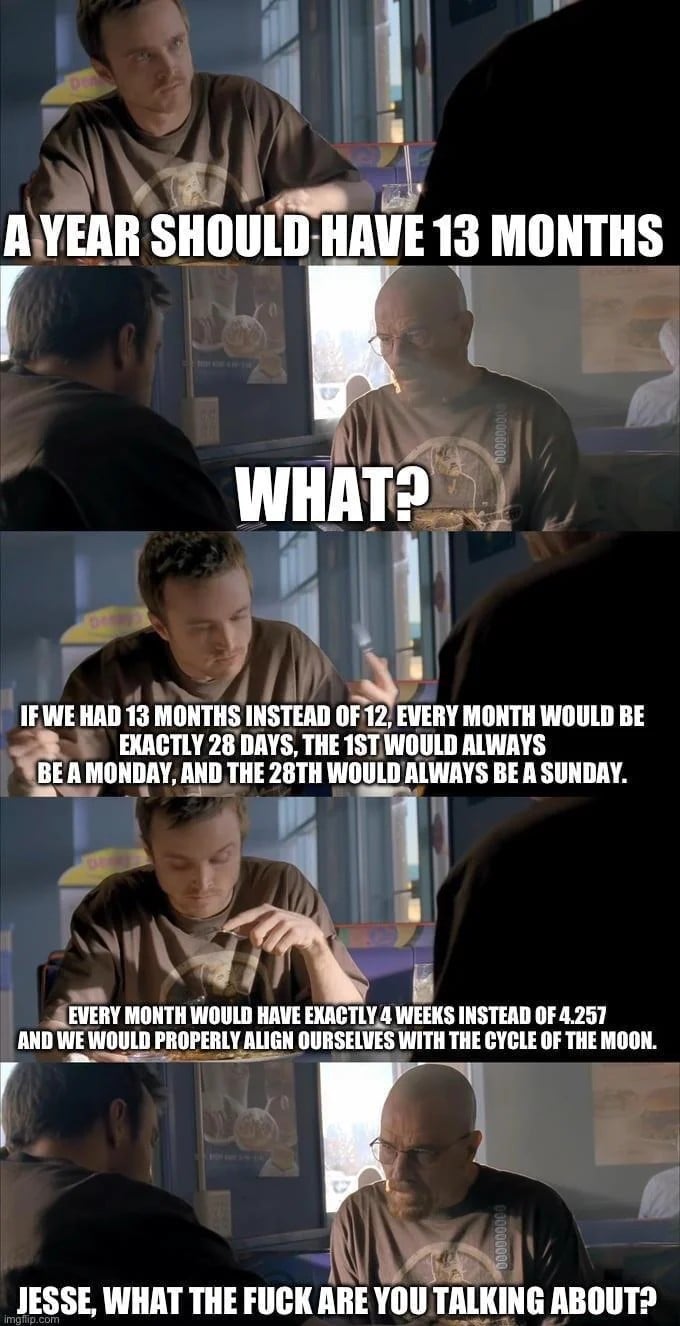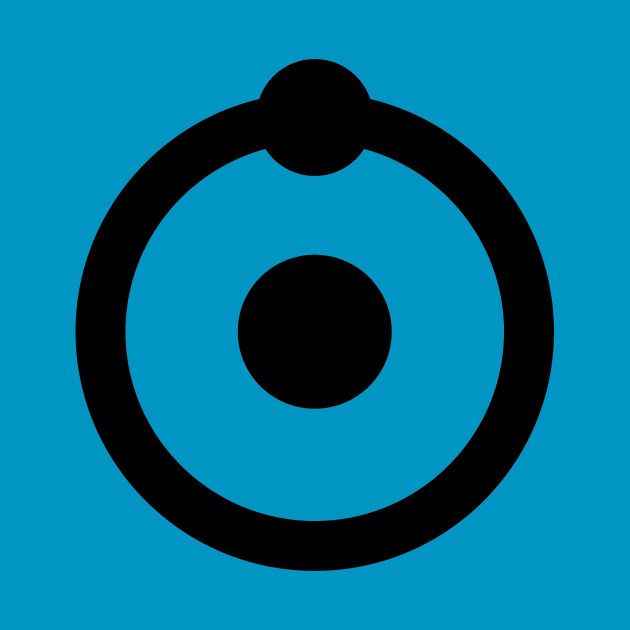“Forget it Jake, it’s Moontown.”
So, I read something on this a little while ago. It has to do with the moon’s weaker gravity making time progress at a different rate, so the lunar time zone gives a precise reference for sub-second (nanosecond I guess?) precision manoeuvres and such like.
The time dilation on the surface of the moon would cause a clock to be 20 milliseconds ahead of a clock on earth after one year
it might be easier just to synchronize the space station clock with earth once a month, but I guess NASA would go for nanosecond precision if they could
That’s why I prefer TAI time zone
Nah dog, its gonna be UTC. End of story.
The moon gains a few seconds every year relative to the Earth due to relativity. Otherwise, yeah, there would be no reason for a new zone.
Its UTC or you gonna have to find a new programmer !
if anything it should be stardate as the united federation of planets agreed to
We’ve gone too far. Everyone just switch to UTC please. Yes, it means some will go to bed at 2pm and get up at 10pm, so what.
I’m just saying, but we did.
Pretty much every electronic thing you own that resembles a computer (phones, tablets, laptops, desktops, even your damned TV) uses UTC. Every. Single. One. Translates that time to “local” whenever it needs to.
So when your TV goes from 9:32 to 9:33, is just showing the converted time from UTC each time.
Almost every device on the planet is keeping time in UTC.
Just because you don’t see UTC time on your device, doesn’t mean that’s not what’s happening. I had an issue where I needed to get into my computer’s bios for something, as soon as the BIOS loaded and showed the time, it was “wrong” because it was in UTC. I’m sure plenty of newer BIOS dialogs are configured to account for timezones now, so yeah. I might be unique in this. It’s still there.
But would the moon work on a 24 hour system at all?
I can’t believe I just typed that as a serious comment
Didn’t Bajor have a 28 hour day? I’m now voting for Universal Bajoran Time
Almost all computers count time as seconds from the epoch (midnight 1/1/1970). That then gets converted into a readable time, which may go through UTC to be converted first, but that’s not how it’s storing it.
You’re referring to UNIX time. And you’re correct.
It’s a count of how many seconds from midnight, January first, 1970, UTC.
Local computers update that time, still in UTC, from time servers, usually over NTP, then translate that time reading from UNIX time in UTC, to a human readable format in the local time zone.
All computers are still keeping track of time from Epoch in UTC.
Unix time is far less universal in computing than you might hope. A few exceptions I’m aware of:
- Most real-time clock hardware stores datetime as separate binary-coded decimal fields representing months, days, hours, minutes, and seconds as one byte each, and often the year too (resulting in a year 2100 limit).
- Python’s datetime, WIN32’s SYSTEMTIME, Java’s LocalDateTime, and MySQL’s DATETIME similarly have separate attributes for year, month, day, etc.
- NTFS stores a 64-bit number representing time elapsed since the year 1601 in 100-nanosecond resolution for things like file creation time.
- NTP uses an epoch of midnight 1900-01-01 with unsigned seconds elapsed and an unusual base-2 fractional part
- GPS uses an epoch of midnight 1980-01-06 with a week number and time within the week as separate values.
Converting between time formats is a common source of bugs and each one will overflow in different ways. A time value might overflow in the year 2036, 2038, 2070, 2100, 2156, or 9999.
Also, Unix time is often managed with a separate nanoseconds component for increased resolution. Like in C
struct timespec, modern *nix filesystems like ext4/xfs/btrfs/zfs, etc.
as soon as the BIOS loaded and showed the time, it was “wrong” because it was in UTC
Because you don’t use Windows. Windows by default stores local time, not UTC, to the RTC. This behavior can be overriden with a registry tweak. Some Linux distro installer disks (at least Ubuntu and Fedora, maybe others) will try to detect if your system has an existing Windows install and mimicks this behavior if one exists (equivalent to
timedatectl set-local-rtc 1) and otherwise defaults to storing UTC, which is the more sane choice.Storing localtime on a computer that has more than one bootable OS becomes a particularly noticable problem in regions that observe DST, because each OS will try to change the RTC by one hour on its first boot after the time change.
That’s a nice theory, it would be a shame if I was only running Windows 10 on my desktop.
Spoiler: I am. No Linux or any other os or bootloader in sight.
That’s strange. As far as I can tell from any web searches, every version Windows still defaults to storing local time to the hardware clock and there are no reports of that changing with an update, nor is there any exposed setting control to configure this behavior outside of regedit. If you’re curious enough, you can check the current setting in the registry at
HKEY_LOCAL_MACHINE\SYSTEM\CurrentControlSet\Control\TimeZoneInformation. Windows maintains the current time as UTC if and only if the RealTimeIsUniversal key is present and nonzero.I expect it’s more likely some other issue would make the BIOS display an hour that’s inconsistent with your local timezone. For example, maybe a bug in the BIOS, maybe a timezone offset setting within the BIOS, or maybe a dead clock battery.
Honestly quote irrelevant. It’s hidden away. It’s not shown to us. It could use literally any frame of reference, like farts since the beginning of times, if it’s converted for you, then it’s not.
Maybe this freak should just text uncle steve whatever he wanted, or a “call me when it’s convinient” message, and then steve will probably see the notification at some point in his morning routine before too long. If this guy really needed to call steve anyways, for whatever reason, he shouldn’t care about time zones, because it’s an emergency.
If you were commonly calling whatever place you were calling, you’d probably be able to intuit what time they woke up anyways, so it’s all moot.
I dunno. I think it’s pretty easy to make a big deal out of time zones and calendar measurements and whatever but I don’t think it really, actually matters that much, because the main thing they facilitate is communication. Time zones and timelines should be engineered more around the human condition, I think, than around anything else.
But then, I think, to construct anything around the human condition is kind of paradoxical. If you create a schedule, then you have created a schedule. I.e. if you construct time, then you imply the existence of something that needs to be measured. That implies deadlines.
Frankly, that’s too much pressure for me, so I’m going to take the more controversial stance here: Abolish time. No more time, no more numbers measuring when I should do what. You’re either gonna tell me whether or not to do something now, or to do it later. The people gotta learn that time is more subjective and contingent, and they gotta start showing up to their work shifts whenever they want to make money, instead of just showing up at a given time when the fuckin steam whistle goes off like it’s the 1800s.
Obviously it would require some getting used to, but already people can’t comprehend time zones, so that won’t change. My grandma called in the middle of the night all throughout our three year stay in Australia.
It’s gonna get much worse when you start to try mapping days of the week onto the new times. Are days gonna be the same everywhere as well, to stay from 0 to 24? If so, have fun saying things like “Let’s find a time on Wednesday/Thursday”. People likely couldn’t be bothered and would probably just use the day that their normal wake-up time falls on to mean the full solar day instead. At which point you could also just say okay, weekdays are still following local solar days. But now what weekday is it halfway around the world? Now you need to look up their solar day.
All this to say - abolishing time zones will introduce the reverse problem for every problem that it seemingly solves. You can’t change the fact that our planet rotates and people in different locations will follow different schedules. Turning the lookup-table upside down is just a cosmetic change that doesn’t remove the situation that’s causing the confusion. I’d rather just stick with the set of problems that we’re already used to dealing with.
Ohh, she knew.
People comprehend days, they comprehend that their day starts at 00:00 and ends at 23:59. Calling to the other side of the world isn’t something most people.do on a daily basis
Not even that. I’m sure you’ve heard “it’s tomorrow when I’ve slept”, no matter what the clock says. Switching terms at midnight will cause confusion more often than not.
Are you high or just not reading what you’re writing? Are you literally claiming that people will get confused when days start at 00:00 and end at 23:59, wherever they live in the world? Because literally no one in this world, except maybe you, is confused by that, because it makes intuitive sense.
and you’ve never been up with friends past your bedtime. 🙄
tldr - you’ll just have to do the conversions in your head now because it’s useful to know where the sun is at different points on the earth when trying to communicate across those points.
Lol.
None of the negatives that this troll article name are actual negatives that normal humans have.
Especially the argument for timezones is “I can just Google what time it is in <timezone>”…
You can always Google “what time is it at <location>”
Which only works when timezones exist. Without timezones, the question would need to be “what time of day is it in <location>?”, and you’d get “morning” or “afternoon”. Any answer to that question is inherently more fuzzy than 8:25 or 17:16.
What time is it in Melbourne?
“The Standard Time is 4:05. The time of day is equivalent to 14:15 in your location.”
Wasn’t that hard to solve. And it’s actually more precise, since it incorporates the changing times of sunrise and sundown.
oh so now we’re right back around at time zones again, wonderful.
except now it’s even more fun because there is zero standardization at all, but users are still going to expect for their computing devices to tell them a time that makes sense. Ah, but culture X thinks the day starts “6 hours before sunrise” and culture Y is more “the day starts when the sun is halfway between sunset and sunrise” and culture Z thinks something even more insane. Oops, now we’ve got locale-based time zones. Locale awareness is honestly even worse than time zones because its just so damn unexpected at times. My own computer has a horrifying mix of US and Europe locale settings, and that is already crazy enough.
stupid people will always think everything is just so simple.
Because it makes getting an intuitive sense of what solar time it is somewhere harder.
Can I call my grandma in a different country? Hmm what time is average midnight there. Okay 8 (so far, same thing as looking up a timezone), and it’s 18:00 now, so 10 hours after midnight, which is like my 23:00. Needlessly complicated with extra steps for the average person.
Sure, you can say, I’ll call you X and that will mean the same thing everywhere, but does not have any information about solar time. And these days, it’s automatically converted if you use a calendar (which you should). This is the point of programming, to make the USERS life easier, not the dev. The end is more important than the means, I think we can agree.
Or: what time is it where my grandma is? Okay, cool, I have a sense of what that is immediately after knowing the answer.
There are reasons we do things this way. Working roughly to solar times has more benefits than being able to say a time and it mean the same moment everywhere.
I say we leave things the way they are, works okay.
Just ask once what time is midday, and do some math
Which I think we can all agree is more work than what we currently need to.
It’s not just one addition, it’s 2 operations following knowing what time midnight is to understand what the solar time it is: what time is it now, minus what time is their midnight, and then you have to add that back to what your midnight is to get a sense of the time. Or you just start thinking in solar time WHICH IS WHAT WE ALREADY DO.
That’s 2 calculations. Currently we do 0.
Innately knowing what time means in films, talking to people over the phone, going to a new country. It would be a huge pain in the arse.
"They met up at 13:00“ great. So where are they in this film? Forcing exposition where currently you might let it be vague.
People who advocate for one timezone simply haven’t thought it through.
Like when i find a recipe that measures volume in Cups, weight in Stones and temperature i Fucks?
Those that propose moving to UTC should take responsibility and take the +12h offset. Why should we let the brits enjoy +0 offset while the rest of the world got the short end of the stick (especially those living in the pacific)?
Sure, I don’t mind. I live in CET.
CEST now…
go to bed at 2pm and get up at 10pm
While we are making reasonable demands, stop using 12 hour time. Sincerely, everyone else.
And please, get all countries to actually start properly accepting ISO 8601 format for dates as a mandatory universal standard…
Obligatory reference: https://xkcd.com/1179/
Why switch? It’s not too complicated a concept for the average person to understand and deal with. In fact, it’s intuitive. Sure in software the logic has a few nuances that are a bit complex when needing to deal with local time and timezones, but that’s why we make the computers do the tricky work.
required reading: https://www.youtube.com/watch?v=-5wpm-gesOY
Personally, I think it’s just easier. Yes, computers and stuff, but we’ve perverted local time long ago with DST and country spanning single time zones, so might as well use one global zone and get rid of the confusion altogether.
No, TAI
If it makes a dev’s life easier there’s no reason not to upend half the planet.
In Europe we’ve been talking about ending DST for years now and it hinges on countries deciding which zone they want to adopt permanently. Why can’t they decide? Because the notion of getting up at six and having lunch at 12 is stronger than the cosmic fact of the sun being in the middle of the sky. We just need to decide how we want daylight to fit into that grind.
I say fuck that. If we can’t decide, don’t. Since we’re changing everything anyway, going to UTC will force everyone to think how THEY want to live their lives. When to open stores, whether to move opening hours in winter or summer, when to go to work (both early birds and night owls are great).
Plus in today’s globalized world, 14:00 will be 14:00 everywhere. You decide for yourself if you’re working then or not if somebody sends a meeting request halfway across the world.
No, 14:00 will be 2pm in freedom land.
Fuck em, send them 24h times and let them figure it out.
Britain: hey guys let’s just use my time k?
Europe: Fuck you.
UTC does not account for time dilation.
the fact that the acronym for Coordinated Lunar Time is LTC tells you everything you need to know about how this will work.
Shouldn’t it have its own time system? And have its own time zones? You can’t give the moon its own single time zone (unless you’re into the idea of a single universal time zone).
That’s actually what they’re doing. The reporting said timezone when the actual order is more about time standards.
They’re creating coordinated lunar time, as a complement to coordinated universal time, so it’s a different time system with details about how it relates to UTC.
https://www.whitehouse.gov/wp-content/uploads/2024/04/Celestial-Time-Standardization-Policy.pdf
Timezones on the moon don’t serve as much function, because the day/night cycle is closer to a month long, and doesn’t map to human rhythms at all. In a hypothetical where we have moon colonies on opposite sides of the moon, there’s no reason for them to not still have synchronized day/night, since it already has no relation to the movement of the sun in the lunar sky.
There’s not really a difference between 0 timezones and 1 timezone, let’s split it and go with 1/2 timezones
Can’t believe the US is putting trains on the moon before making them viable on Earth
No link to the article in the picture?
Also, wouldn’t it just be simple enough to make the Moon GMT, and be done with it?
wouldn’t it just be simple enough to make the Moon GMT
You’d think so, but the problem is that because of gravity, clocks on earth and on the moon will very slowly run out of sync. Idk ask Einstein.
You’d think so, but the problem is that because of gravity, clocks on earth and on the moon will run out of sync. Idk ask Einstein.
Yeah I’m aware. It would require ongoing recalibrations of the time display units on the Moon.
Then again if they could just pick up the atomic clock signal (WWV, etc.) from Earth, and then add to it for the time it takes for the signal to cross space from the Earth to the Moon, etc.
At the end of the day it’s just about having all the homo-sapiens going to bed and waking up at the same time, so they can do business in the same window together.
Greenwich Moon Time? I’ll see myself out…
Greenwich Moon Time? I’ll see myself out…
Well played, sir/madam. Well, played. /slowclap
Moon people just have to switch to Universal Moon Time.
What about Earthmoon Savings Time?
The Royal Observatory Greenwich:
“Well, as the first to co-ordinate time we-”
The International Telecommunication Union and International Earth Rotation and Reference Systems Service in Unison:
“Excuse me, I think you’ll find we manage the time.”
NIST: “I don’t see your footprints up there! We’re going off my Omega Speedmaster!”
Shouldn’t the moon have… 24 time zones as well, depending where on the moon you currently are?
Because the moon is tidally locked to the Earth, some things are quite different up there.
The day/night cycle is a lot longer, from sunrise to sunrise is ~28 Earth days. 14 straight days of sunlight, 14 straight days of darkness. Depending on where you are on the surface, you may never be able to see Earth at all, or if you can it remains more or less fixed in the sky; if you really pay attention it slightly wobbles. The waxing and waning of the Earth’s disc are in sync with the sun as well, but not necessarily in phase. For example, if you’re on the Moon’s meridian, New Earth occurs at noon, but if you’re to the East or West it will lag or lead. You can just barely make out major surface features of the Earth enough to tell that the Earth rotates, but at a period that has nothing to do with your local conditions.
There wouldn’t really be any utility to dividing the Moon into 24 time zones, it wouldn’t line up with anything meaningful on Earth or to human circadian rhythms, so for expeditions like the Apollo program or upcoming Artemis flights, you’d just keep an onboard mission clock for the benefit of the crew and rely on artificial lighting and shades to maintain an Earth-like day/night cycle.
It feels to me like this is a problem that doesn’t need to be solved yet if ever; I would wait until there are actual people living on the Moon and let them solve the problem in a way that fits their needs, which we cannot fully anticipate from down here on Earth.
I will note that time zones make more sense on Mars than the Moon. Mars has a rapid day/night cycle fairly similar to Earths, a Martian sol is about a half hour longer than an Earth day, fairly easy for humans to adapt to and live la vida loca. Some humans already have; NASA crews working on our various rovers adjust their working days to their rover’s local solar conditions. They wear watches calibrated for Martian sols and the wake up and go to bed at a different Earth time every day so that they can work from the rover’s sunrise to sunset, when they have light to see and when Spirit and Opportunity had power to move. And because the rovers are scattered across the surface of Mars, their local sunrises and sunsets happen at different times, so we already have de facto time zones on Mars.
So, there is an actual utility for it, it’s just not people centric.
Having a framework for how you convert the clock measurements from the lunar reference frame to terrestrial reference frame is helpful for orbital maneuvering and navigation, as well as communication coordination.They’re not building a "UTC+5” style timezone, but a “given the moons mass and orbit, here’s how we define the time ratio between the earth and moon so we can consistently calibrate our clocks”.
No, the moon’s rotation isn’t on a 24-hour cycle. I’m not a astronomer, but I pretty sure since it’s tidally locked to earth and on a 28-day cycle around the earth, a lunar day is actually 28 Earth days, but I’m not actually sure how that would factor into the number of time zones (I’m pretty sure it would be more complicated than just 24 time zones to match 24 time zones on earth, though).
Plus, I think the speed of the moon relative to the sun is different enough from Earth that you need to take relativity into effect, which is the real headache here.
24 time zones on earth, though
Even if you just count UTC offsets, there’s 38 time zones: https://en.m.wikipedia.org/wiki/Time_zone
There’s more than that though, due to Daylight Saving Time. The rules for DST are part of the definition of the time zone. For example, in Australia, Queensland and Victoria are both UTC+10. However, Victoria observes DST while Queensland doesn’t, so technically they’re two separate timezones (in the Olsen database, they’re
Australia/MelbourneandAustralia/Brisbanerespectively).Pretty sure it’s both pointless and impossible to have an earth-like timezone system in an object that has coordinated rotation and translocation cycles. Meaning this mess we call “timezones” shouldn’t exist in the moon.
Shouldn’t exist anywhere
It’s pretty simple, actually. The time zones are on average 1 hour apart. So there should be about 24*28=672 time zones on the Moon. SIMPLE.
Or we invent 24 lunar hours and then we’re back to 24 timezones.
However I don’t think keeping the sun overhead at noon is the goal here. That stuff is only important to humans. The real issue is figuring out how to count time on the moon in such a way that it doesn’t run out of sync with how we count time on earth because of relativistic effects.
The relativistic effects would be so small in human terms that the clock could just be synchronized with Earth time once daily and nobody would ever notice.
Yep, relativity accounts for a difference of like 50ms drift per earth day. I would assume that it’s forward drifting if you’re on earth but backwards if you’re on the moon.
Take that, timezone whiners!
It’s been a long time since I took modern physics, so I’m not positive, but I think you’re right that the moon would have time moving slower, and if your 50ms/day is right, then you’d need to do something like skip a second every 20th day on the moon to keep pace with Earth. We could call it an “anti-leap-second”
Programmers, that seems pretty simple; what’s the big deal? /s
anti-leap-second
HORROR
We’re close to skipping a second too here on earth since the Earth had actually sped up a bit the past decade.
“An atomic clock on the moon will tick at a different rate than a clock on Earth,” said Kevin Coggins, Nasa’s top communications and navigation official. “It makes sense that when you go to another body, like the moon or Mars, that each one gets its own heartbeat.”
It’s possible that they don’t end up putting atomic clocks on the moon, but it’s on the table, they haven’t worked out the details yet.
The moon’s day length is so long that it wouldn’t make any sense for any crewed mission to use it, they’re going to need their own lights on an arbitrary 24 hour cycle anyway, so there’s no reason not to have every future crewed mission there use the same one
I mean, this is the real answer here, but you can’t just put them on UTC because of the relativity like we were discussing elsewhere, so it would still have to be a separate time zone for programming and timekeeping purposes, even if humans won’t be able to tell the difference
So, just plonk an atomic clock on the moon and call that moon time. Ocasionally synchronize moon time with UTC.
That’s pretty close to what they’re doing. The tricky bit is detailing how you convert a lunar timestamp to a terrestrial timestamp.
Jostling clocks with things like leap seconds turns out to be more trouble than it’s really worth. Better to just let them get out of sync but be able to precisely define what the drift is.
i agree. the moon should suffer with all of us.
It’s own timezone? It’ll need it’s own clock. A moon day is about 28 Earth days.

That may make sense if you’re on the surface of the moon, but that’s not the case. The moon time zone is for the moon orbiting space station proposed by NASA
std::chrono::neutronstar_clockHow long is a moon year?
If a year is how long it takes to go around the sun then a Moon year is the same as Earth’s
The PR is getting way ahead of rocketry results. It’s not helping that Elon is involved.
























